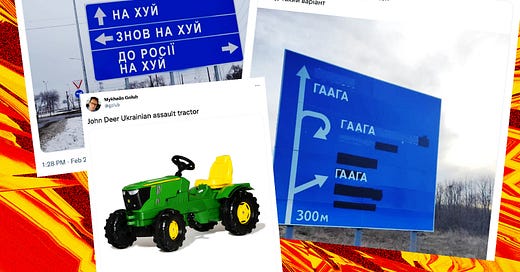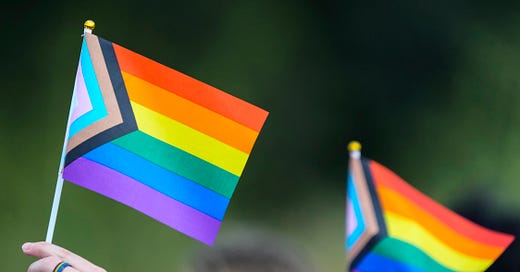When Is It Okay to Laugh During War?
In defense of jest, here’s how humor plays an important role in survival.
In the January lead-up to Russian forces raining missiles down on Ukraine, Gen-Z social-media users embarked on an unconventional peacekeeping mission in the comments sections of unofficial Russian state accounts on Instagram and Tiktok. Young commenters begged Putin to not invade—with joking pleas and sexual overtures, calling him “Vladdy Daddy,” along with ironic condemnations like, “WWIII is not the vibe.”
While clearly an early collective coping mechanism that went viral before the invasion began, as Russian aggression turned from uncertain assumption to cruel reality, reporting from Buzzfeed and others on the meme-ification of diplomacy was vilified by those insisting that making jokes is inappropriate while there are people dying in Ukraine. But while it’s bad to callously make light of human suffering, it’s also important to realize that humor plays a role in the way people adapt and deal with suffering.
Images of road signs with directions for Russia to “Fuck off” and political satire memes have been a small part of Ukraine’s success in dominating the information war—giving Western audiences accessible and relatable material to latch on to. It is also telling that the person who has risen to the occasion and demonstrated unfathomable courage and leadership in the face of near-certain death and the decimation of his country is a former comedian.
Using comedy in response to a massive tragedy in this way is nothing new—the impulse to use humor to make sense of horror is a well-documented and near-universal human instinct.
It has been so for both distant outside observers and those facing fire on the frontlines: Journals from the First World War reveal the ways soldiers used language to keep themselves entertained in the trenches. “In both Australian and French trench journals, dark stories of war co-existed with cartoons, jokes and puns. Humour in trench journals was used as a safety valve, an outlet for these soldiers stuck in the trenches and scared,” says Véronique Duché, a professor at the University of Melbourne. “It provided relief and distance, particularly from the enemy. Naming ‘him’ and portraying ‘him’ as ridiculous are ways of fighting and mastering the enemy. Mocking the enemy’s language goes together with celebrating the mocker’s own national language.”
Those who see dark humor as blasphemy misunderstand the human inclination to turn to comedy in the face of tragedy. It’s a sad sort of posturing that conveys a rigid and ineffectual understanding of moral seriousness and solemnity that no one is actually rejecting or contradicting with jokes made at Russia’s expense. In Ben Lerner’s 2014 novel, 10:04, the protagonist remarks on how humor worked where the “elegy cycle” couldn’t:
The Challenger joke cycle, which seemed to exist without our parents knowing, was my first experience of a kind of sinister transpersonal syntax existent in the collective unconscious, a shadow language to Reagan’s official narrative processing of the national tragedy. The anonymous jokes we were told and retold were our way of dealing with the remainder of the trauma that the elegy cycle initiated by the Reagan-Noonan-Magee-Hicks-Dunn-C.A.F.B (and who knows who else) couldn’t fully integrate into our lives.
The narrator goes on to say that the Challenger jokes weren’t particularly good, interesting, or even funny—but wonders if they could be thought of as “bad forms of collectivity that can serve as figures of its real possibility: prosody and grammar as the stuff out of which we build a social world, a way of organizing meaning and time.”
Joking can also work as a digestive aid, or a way to metabolize despair rather than be consumed by it. “Morale wins wars, solves crises, is an indispensable condition of a vigorous national life,” wrote Arthur Upham Pope in 1941. This is as true today as it was then. And humor assumes a base level of optimism because it is a shield against despair, even when it is tempered by caution and grief.
There is a paradox to comedy: It “must attract and repel at the same time,” wrote Paul Woodruff in 1997.
“Comedy itself sometimes separates what is laughable from what we are supposed to care about,” Woodruff writes, “and this may be part of the way it defines community—we, who laugh, versus the outsiders at whom we laugh.” It’s not that Westerners are trying to turn the Russian-Ukrainian conflict into a superhero narrative of good guys and bad guys, but to reinforce that Putin has chosen a path that puts him at odds with the rest of the world.
Paul Cantor, the late University of Virginia literary scholar, taught that what the Greek plays and theater tradition show us is how comedy feeds off tragedy. Jason Stevens, an associate professor of English at Cornerstone University, wrote in response to Cantor that:
Comedy teaches us that we are a lot like others, and that that is a good thing. It makes empathy and understanding possible. In tragedy, community is shattered. In comedy the social order’s well-being depends on our recognition of and participation in it. . . . Cantor suggests that comedy is perhaps even more philosophic than tragedy because comedy breeds in us a skeptical, questioning attitude. . . . The more exalted and noble one’s path, the more one is in need of holes punched through pretension and of mirror-moments, painful though they may be.
The same could be said for grandiose and delusional war paths being in need of holes punched with a sense of oppositional humor, undaunted by the odds.











